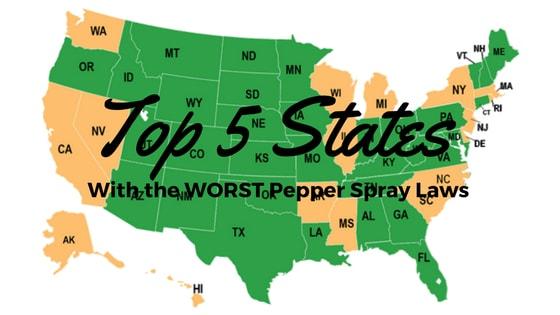Table of Contents
- Understanding State-by-State Variations in Pepper Spray Legislation
- Key Restrictions and Legal Limits to Be Aware Of
- Navigating Purchase, Possession, and Usage Regulations
- Practical Tips for Complying with Pepper Spray Laws in Your Area
- The Way Forward
Understanding State-by-State Variations in Pepper Spray Legislation
When it comes to carrying or purchasing pepper spray, not all states operate under the same rules. Some states impose strict restrictions on the allowable concentration of the active chemical, while others limit the type or size of canisters permitted. For instance, a state might require individuals to obtain a permit before purchasing pepper spray, whereas another might ban its use entirely for civilians. These regulations are designed to balance personal safety with public health concerns, highlighting the importance of understanding the nuances before making a purchase or carrying pepper spray for self-defense.
Key variations you should be aware of include:
- Age restrictions: Some states set a minimum age for legally buying or possessing pepper spray.
- Spray strength limits: Maximum permissible concentrations of Oleoresin Capsicum (OC) vary significantly.
- Size and formulation: Restrictions on canister size and whether certain irritants are allowed may apply.
- Permit or registration requirements: A few states mandate that users register their pepper spray or carry permits.
- Restricted locations: Carrying pepper spray may be prohibited in schools, government buildings, or on airplanes.
Key Restrictions and Legal Limits to Be Aware Of
When it comes to carrying pepper spray, it’s crucial to understand that many states impose limits on the size and concentration of the canister. Some jurisdictions restrict the allowable spray volume to fractions of an ounce, while others regulate the percentage of active ingredients like oleoresin capsicum (OC). Additionally, there are rules about where pepper spray can be legally carried-places such as schools, government buildings, or airports often have strict prohibitions. Failure to comply with these regulations can result in fines, confiscation, or even criminal charges. Always check local statutes before purchasing or carrying pepper spray to ensure you’re within legal boundaries.
Beyond size and concentration, several states also enforce specific usage and purchase restrictions. For example, certain states require buyers to be over 18 years old, while others mandate that individuals obtain permits or complete registration processes before legally carrying pepper spray. Some states even limit the types of delivery mechanisms allowed, prohibiting sprays that project beyond a set distance or that contain certain propellants. These nuanced rules emphasize the need for responsible ownership and highlight that ignorance of the law is no defense. Key points to watch for include:
- Age requirements for purchase and carrying
- Permit or registration mandates in select states
- Restrictions on spray range and nozzle design
- Prohibited locations for possession or use
Navigating Purchase, Possession, and Usage Regulations
Understanding the intricate landscape of pepper spray regulations is essential for responsible ownership. Many states impose specific criteria not only on the purchase but also on the possession of pepper spray. For example, some jurisdictions require purchasers to be above a certain age-commonly 18 or 21 years old-and may demand proof of residency or government-issued identification. Additionally, product concentration limits often vary, with some states capping the chemical strength to reduce potential harm while ensuring self-defense effectiveness. Buyers should also be aware of restrictions concerning the container size and allowable ingredients, as these specifications are designed to balance public safety and personal protection rights.
Key considerations include:
- Mandatory registration or permits before carrying pepper spray in public spaces
- Banning of pepper spray on federal properties, schools, and certain public transport systems
- Restrictions on usage that limit deployment to self-defense situations only, with penalties for misuse
- Prohibitions against possession by individuals with certain criminal backgrounds or restraining orders
Practical Tips for Complying with Pepper Spray Laws in Your Area
When considering carrying pepper spray, first and foremost, verify the legal limitations specific to your state or local jurisdiction. Some areas may restrict the container size, concentration of the active ingredient, or require permits to legally possess or carry pepper spray. Always check official government websites or consult with local law enforcement to gather up-to-date and accurate information. Additionally, be mindful of age restrictions; many states mandate that users must be over a certain age to purchase or carry pepper spray.
To ensure you’re fully compliant and avoid legal complications, maintain clear documentation of your purchase, including receipts and product information. When traveling, research the rules of each state you pass through, as pepper spray laws can differ dramatically. Consider enrolling in a self-defense training course that covers the proper and responsible use of pepper spray. This not only boosts your confidence but also helps you understand when and how to deploy it within the boundaries of the law.
- Confirm maximum allowable spray size and concentration levels
- Verify age and permit requirements prior to purchase
- Keep your pepper spray accessible but secure
- Stay informed on interstate transport regulations
- Practice responsible usage through training and education
The Way Forward
In a world where personal safety is paramount, understanding the legal landscape surrounding pepper spray is essential. Laws vary significantly from state to state, with specific restrictions on possession, purchase, and use that can have serious consequences if ignored. Staying informed not only helps you protect yourself responsibly but also ensures you remain on the right side of the law. Before carrying or using pepper spray, take the time to research your state’s regulations and any local ordinances that may apply. When it comes to self-defense, knowledge truly is your best protection. Stay safe and stay informed!Check Our Other Blogs
- StunGun – Your Trusted Source for Stun Guns, Laws, and Self-Defense Tips
- PepperSprayLaws – Your Trusted Resource for Pepper Spray Information
- StunGunLaws – Your Trusted Guide to Stun Gun Legality and Safety




